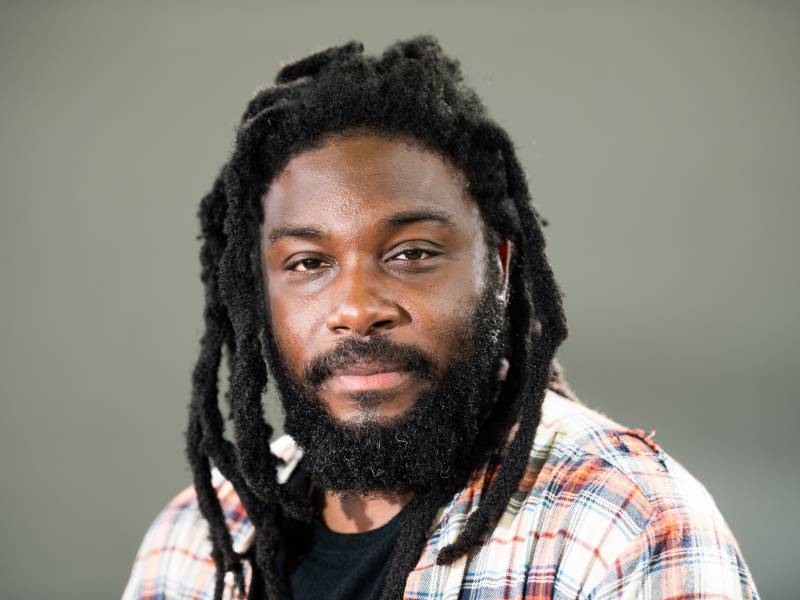All told, Reynolds visited some 16,000 students at 47 schools across 25 states, many of which were in rural and underserved communities.
Reynolds wants whoever succeeds him in the role to see it as a job, not just an award.
"Stories happen to be the most human thing we have to offer, right?" he says. "Which means that the work that we're doing in storytelling is actually human work. And I just want to make sure the next person understands that as they take on the task."
In a conversation with Morning Edition's A Martínez, Reynolds spoke about the importance of young people's stories and fostering a love of reading.
This interview has been edited for length and clarity.
Interview highlights
On why he thinks young people don't like to read
It's boring. That is the reason why. And it's boring unless we're talking about sort of learning differences, right. Which is a very different conversation. But for the most part, young people don't like to read because it's boring and because it takes too long. By the way, I don't disagree with these things. I don't think all reading is boring, but I do think some reading is boring. And I think it's unfair for us to act like we as adults don't know that to be true. There are lots of kids looking for different things. I think there are some young people growing up in environments where they're desperately seeking to escape and see themselves slay the dragon. And for those young people, we have tons of books for them. Right. But I also think that there are other young folks who are just looking for a starting point. And that starting point needs to look and feel and sound and taste like them.
On the importance of seeing yourself in literature
You know, as a Black person, when I walk in a room and I spot the Black people in that room, it makes me feel safe and when I spot those Black folk, I can see everybody much more clearly, right? I'm open in a different way, right? I think that's a human thing. And it's no different when it comes to literature.
On why he didn't find a passion for reading until the age of 17
I felt like they were disconnected from my reality. ... I felt like books were almost in some passive way, judging me for being who I was, simply by erasing me from the idea, like from the canon in and of itself, right? If I'm not shown or if I don't exist in a story, then that means that somebody doesn't find my life valuable enough to talk about, right? So why would I engage in something that's not engaging with me? ... One book will never be enough, right? Like we could write 500,000 books and it still won't capture the Latinx experience. We talk about diversity. It's not just diversity and creating space for Latinx communities or Black communities or LGBTQIA+ communities. It's also writing diverse versions of those stories because there's so many different versions to tell. We're all human beings.
On the first book he finished — and loved
For me, it was Richard Wright's Black Boy. And the reason I finished it is because on the second page of the book, young Richard Wright sets the curtains on fire and burns his grandmother's house down. Which means this isn't going to be a boring book. Why should I have to wait 100 pages to get to the good part? And so for me, Richard Wright, he hooked me. And then after he hooked me, I was willing to go along for the ride. ... And the feeling of completion is that is half the battle. Like once you get to the end of a thing, the endorphin rush of knowing that you did it just makes you want to do it again.
On reading loss during the pandemic
Yeah, it's definitely something to consider and it's a scary thing. But but you know, I'll be honest with you, as concerned as I am about reading loss and learning loss, I'm not nearly as concerned about that than I am with the loss for the desire to live. And so though I want young people to catch up, what I know is that is possible, right? We can catch up when the reading allows. We can catch up on some of the deficiencies that have taken place or that may have been settling in now. But what we can't do is catch up on a young person who decides that they've just had enough, that they feel so insignificant that they're ready to hang it up. I'm more concerned with pouring love and compassion and hope and grace and patience into young people, because at the end of the day, though I love books, they're just not as important as the young people themselves.
On his advice for the next ambassador for young people's literature
Whoever takes on this road next, all I want them to do is make sure that they understand that this is not an award. This is a job. It's a real responsibility, which means that they have to throw themselves at it with all the fervor and love in there being to make sure that the young people in this country know that we care not just about whether or not they read or write, but that we care about them.



9(MDAxOTAwOTE4MDEyMTkxMDAzNjczZDljZA004))